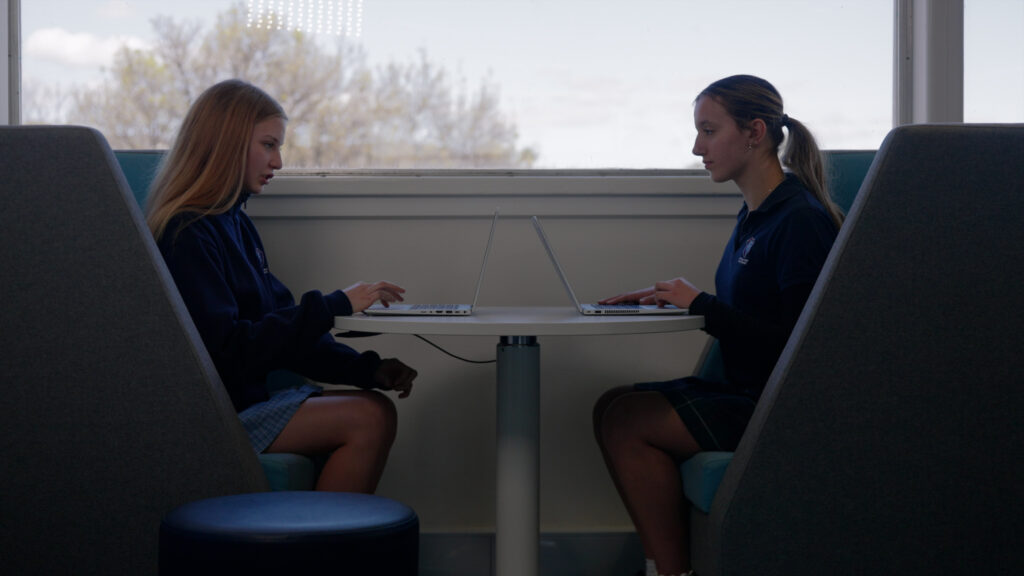When other states banned the use of artificial intelligence in schools, South Australia took a step forward. We talk to the Education Department boss about the new chatbot that’s changing the game of learning (and now inspiring other jurisdictions to jump on board).
Whether you love it, are sceptical, or don’t know anything about it, there’s no denying artificial intelligence (AI) is the future. And in many parts of the world, including at eight South Australian public high schools, AI’s not just the future – it’s now.
When technologies like ChatGPT came out, most schools and universities around the world were quick to ban them out of concern, scepticism or reluctance to welcome change. SA went the other way, working in partnership with Microsoft to develop EdChat.
What is EdChat?
EdChat is an artificial intelligence chatbot developed by the Education Department of South Australia, that’s custom-built for teaching and learning. It uses the same model as ChatGPT, but with extra safety features designed to improve data security and protect students from accessing inappropriate content.
Where and how EdChat is being used
Eight selected high schools across the state are currently using EdChat. These include: Ceduna Area School, Streaky Bay Area School, Adelaide Botanic High School, Adelaide High School, Mitcham Girls High School, Unley High School, Thebarton Senior College and Glenunga International High School.
Students and teachers at these schools can prompt the technology by asking questions they’d like to learn more about. The generative AI chatbot gives responses in an education context.
EdChat is able to meet the individual needs of students, including those with learning disabilities who might find it more difficult to access the curriculum or what’s going on in the classroom.
Is EdChat safe for students?
In short: yes. The filter on EdChat is stronger than that of ChatGPT, and is continuously monitored for areas of improvement.
“One of the things that was important to us what that the technology doesn’t learn from our students, so we wanted to be really careful and make sure that if our students were putting any personal information in, that wasn’t getting sucked up and taken off in a way that we couldn’t control,” says Chief Executive of the Department for Education Martin Westwell.
“Anything that the students put in stays within our system. It doesn’t go anywhere else.
“Of course there’s some people with worries around inappropriate use, but what we’re finding across the board is that our students are using this technology in really positive ways.”
What do students think of EdChat?
Overall, the feedback from students has been extremely positive, says Martin. In fact, students are already embracing the technology in interesting and useful ways the Department didn’t foresee.
“There are so many different ways that our students have found to use the technology that we probably wouldn’t have thought of to tell our students, but we’re learning from them all these amazing ways that they’re using the technology,” he says.
For example, it’s a big timesaver. Instead of waiting for their teacher to come around and help, students can ask EdChat and talk through the answer with their teacher afterwards. Martin has also seen the technology used by students to practise for language tests, generate new ideas for thinking and to simplify the wording of difficult questions.
Could AI replace in-person teachers in the future?
“I can’t see this technology replacing teachers, but what I can see is that a teacher with AI might replace a teacher without AI in the future,” says Martin.
“I think that human interaction becomes more important when AI is in the world, because you want to have a discussion with a person about what the technology is providing to you.
“What it does is free up teachers to talk to students about their resilience, their curiosity, the human factors that are actually going to be more and more valuable as technology helps people to do some of the more routine things.”
Will EdChat be introduced to more South Australian schools?
While the Department for Education expects this technology will eventually be used in all South Australian schools to some extent, it’s moving “at an appropriate pace,” says Martin. EdChat will only be rolled out at schools deemed ready to adopt the technology.
“If we find something in there that we don’t like, something that’s not working, or there’s something that makes us think ‘hang on, we need to stop and think about this,’ we’ll do that.”

How AI is being embraced in schools nationally and internationally
Despite initially saying ‘no’ to the use of AI in education, schools around Australia – and beyond – have been inspired by what’s happening in South Australia. Microsoft’s global office has shared SA as an example to the rest of the world, and other Australian jurisdictions have since jumped on board, including New South Wales with ‘EduChat’.
“It’s a great thing about federation that one state can take a lead and others can learn from that,” says Martin.
“I’m sure there’ll be much for us to learn from our colleagues in other states as we all go on this journey together.”
What it all comes down to, says Martin, is students being the most brilliant they can be: “There’s no point in developing young people in a way that makes them good at school if they’re not good in the world. It always comes back to that interaction between people and how technology is helping.”

















